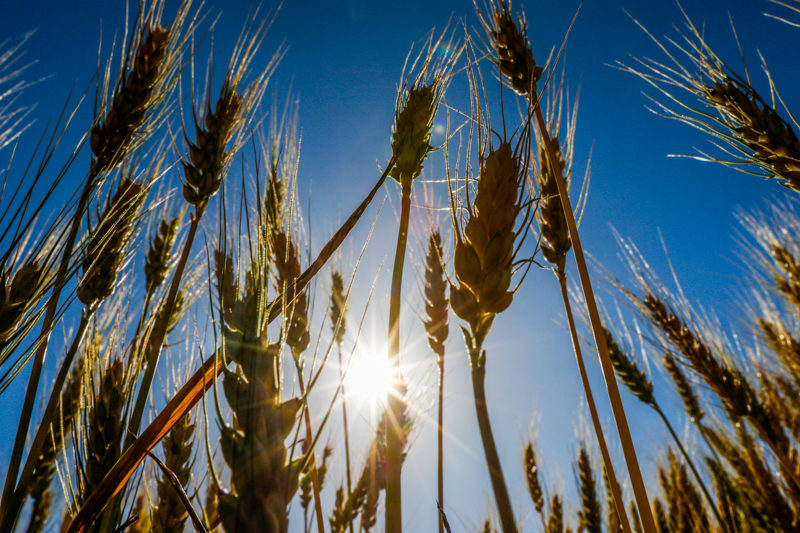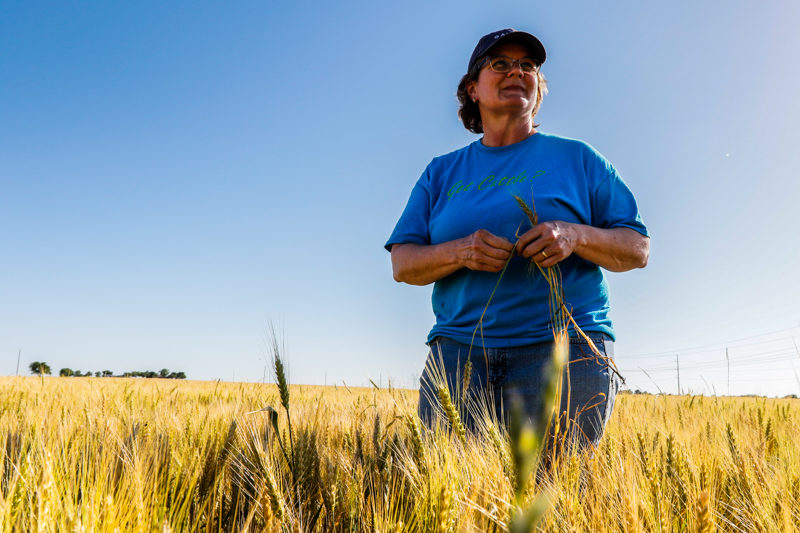Texas Agriculture Seeks to Expand International Markets
By Christopher De Los Santos
Photography By Denise Cathey
Reporting Texas

A crop of Cedar Wheat grows in one of the fields that make up the Fleming Grain & Cattle LLC ’s 2500 acre’s go cropland in Troy, Texas. The crop will be harvested around the first week of June and will later be driven to Houston for export. Denise Cathey/Reporting Texas
The Texas Wheat Association wants to grow sales in Brazil. The U.S. Meat Export Federation wants Australia to buy more hams. And the Texas Cotton Association is reaching out to Vietnam.
Lobbyists for the state’s agricultural producers are working aggressively behind the scenes to blunt the impact of a U.S. trade war with China, which imported $1.1 billion in agricultural and livestock products from Texas last year. Their goal is to expand market share in other countries as a safeguard against possible Chinese tariffs.
“Expanding international markets is what we need right now,” says Steelee Fischbacher, director of policy for the Texas Wheat Association.
Texas growers sell half of their wheat overseas, with Mexico, Japan, Brazil and China topping the list of importers. President Trump’s desire to renegotiate the North American Free Trade Agreement and the Trans-Pacific Partnership may complicate trade relationships with Mexico and Japan, Fischbacher says, “but we can work on what we sell to Brazil.”
While Brazil imposes a tariff on international wheat, it allows a designated amount of U.S. wheat into the country at a much lower tariff, according to Fischbacher. In recent years, she says, Brazil has not bought the full amount at this lowest tariff, which the Texas Wheat Association views as an opportunity now.

Driving down a road near Fleming Grain & Cattle LLC ’s. Property, Lynn Fleming’s truck passes a neighbor also growing wheat in their fields. Denise Cathey/Reporting Texas
Even before the prospect of a trade war loomed, the Meat Export Federation was anticipating a drop in demand for U.S. beef in China, due to a predicted cyclical increase in Chinese pork production. “We are already looking for other countries to buy our pork,” says Joe Schuele, spokesman for the trade group. “The Chinese are primary consumers of non-muscle cuts of U.S. pork — feet, hooves, lips, tails, ears and so on. We can sell more of these non-muscle cuts in Vietnam and the Philippines. We are also asking Australia to buy more hams.”
Schuele believes the quality of Texas beef will prevent a significant drop in Chinese business.
“Texas and U.S beef sell primarily in high-end restaurants and premium hotels in large coastal Chinese cities,” he says. “The wealthy Chinese who want to eat U.S. and Texas beef are among those likely to be more concerned with flavor, tenderness and quality and least likely to be concerned about a price increase.”
Gene Hall, spokesman for the Texas Farm Bureau, agrees that growers of Texas beef and pork are less threatened by possible Chinese tariffs than are the state’s growers of cotton, corn, soybeans, sorghum and wheat. “I want to emphasize that these tariffs have not gone into effect yet,” Hall says, although Bloomberg has reported that China has stopped buying U.S. soybeans. “We at the Texas Farm Bureau hope the governments of our great nations will work out their differences before resorting to a trade war.”
Texas cotton growers sell the vast majority of their crop overseas, “A tariff from China would certainly disrupt the cotton trade,” says John Robinson, a Texas A&M University economist specializing in the cotton industry. But Texas cotton growers will continue to sell their crop, though perhaps for a lower price.
“China’s textile mills still have to make their finished products, and they still need thread,” Robinson says. “What we will probably see is this: Vietnam and other thread producers in South Asia and the Pacific region will buy the Texas cotton. The thread producers will make Texas cotton into thread and then sell it on to China.”

Lynn Fleming and her husband Robert have to drive their wheat harvest to Houston where it will be placed on a ship for export as the local market is poor for wheat. Denise Cathey/Reporting Texas
Despite optimism from trade associations, the view from the soil remains gloomy. Texas growers such as Ken Davis and Robert Fleming are filled with apprehension these days.
“It’s fear driving the markets right now,” says Davis, who, like Fleming, raises wheat, corn and cattle. Ken Davis Farms are headquartered in Grandview.
Fleming, of Fleming Grain and Cattle Co. in Troy, describes China as “a very important future market where we look to sell large quantities of beef in coming years.”
“We only got into the beef market in China for the first time last year, so we haven’t sold much beef there yet,” Fleming says. “We don’t stand to lose much compared to last year.” Lost opportunities weigh more on his mind regarding the cattle business.
Fleming has seen tornados tear apart his wheat and corn storage bins and hail ruin up to half of his corn crop as recently as 2013. “The two biggest concerns I have right now,” he says, “are bad weather and Trump’s trade wars.”